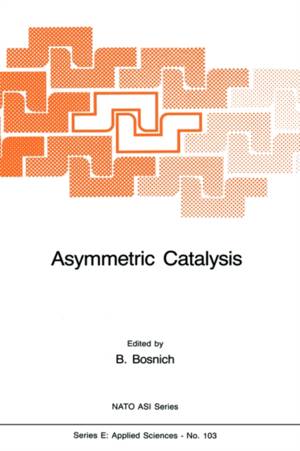
- Afhalen na 1 uur in een winkel met voorraad
- Gratis thuislevering in België vanaf € 30
- Ruim aanbod met 7 miljoen producten
- Afhalen na 1 uur in een winkel met voorraad
- Gratis thuislevering in België vanaf € 30
- Ruim aanbod met 7 miljoen producten
Zoeken
Omschrijving
The rate of advance in areas of science is seldom constant. Usually certain fields effloresce with activity because of the ealization that solutions are possible to long standing important problems. So it is now with asymmetric catalysis, a field which promises to change profoundly the strategic thinking of synthetic chemists. As this Report will show, reagents which can induce catalytic enantiocontrol of chemical transformations could represent the ultimate synthetic method. Nearly all synthetic strategies of complex molecules involve steps which require enantiocontrol and, in many cases, a specific catalytic transformation embodying enan- tiocontrol has enormous advantages in terms of the rate and economy of the reaction. Because asymmetric catalysis is in a formative stage, workers with different backgrounds have joined the field. This Workshop had representatives with organometallic, organic, structural, kinetic, enzymatic, microbiological and industrial backgrounds. Each had his own perspective and this Report represents a consensus of this group of eleven people. The result is probably as compre- hensive and balanced a view of the subject as is possible at present. It is hoped that those who have until now had but a glancing interest in asymmetric catalysis will find this Report a useful indication of its present state. We believe that asymmetric catalysis will have an increasing impact on the development of chemistry and will eventually dominate much of synthetic and industrial chemistry.
Specificaties
Betrokkenen
- Uitgeverij:
Inhoud
- Aantal bladzijden:
- 172
- Taal:
- Engels
- Reeks:
- Reeksnummer:
- nr. 103
Eigenschappen
- Productcode (EAN):
- 9789024732593
- Verschijningsdatum:
- 30/11/1985
- Uitvoering:
- Hardcover
- Formaat:
- Genaaid
- Afmetingen:
- 156 mm x 234 mm
- Gewicht:
- 421 g

Alleen bij Standaard Boekhandel
+ 197 punten op je klantenkaart van Standaard Boekhandel
Beoordelingen
We publiceren alleen reviews die voldoen aan de voorwaarden voor reviews. Bekijk onze voorwaarden voor reviews.







